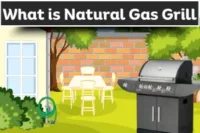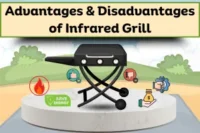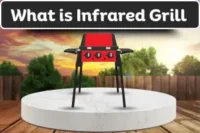Grill Safety Tips: 20 Easy Ways to Stay Safe While Cooking Outdoors
Published: 27 May 2025
Grill safety tips might not sound exciting, but they’re essential — especially if you’re just starting. Every year, thousands of backyard barbecues turn dangerous because of avoidable mistakes. The good news? Staying safe at the grill is simple when you follow the proper steps.
In this post, I’ll walk you through 20 must-know safety tips to help you grill confidently — without the risk.
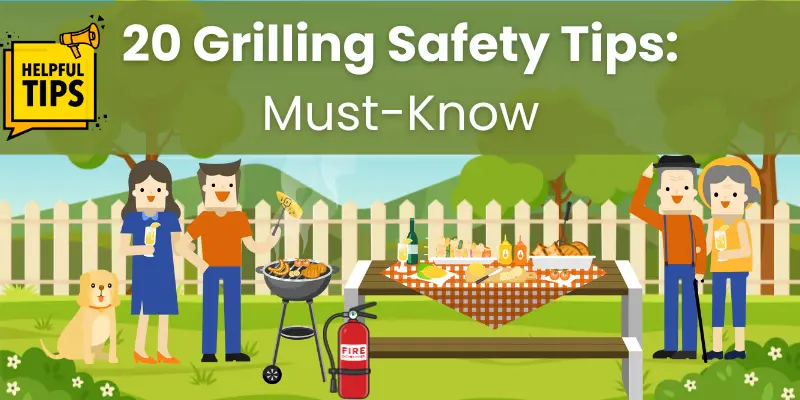
Grill Safety Tips
Here’s a complete list of practical, no-fluff grilling safety guidelines every beginner should follow to stay safe while enjoying outdoor cooking. These simple habits can prevent accidents and give you peace of mind while grilling.
List of most important grilling safety tips:
- Keep Your Grill at Least 10 Feet from Structures
- Clean Your Grill Regularly to Avoid Grease Fires
- Always Check for Gas Leaks Before Firing Up
- Never Leave the Grill Unattended While Cooking
- Keep a Fire Extinguisher Nearby
- Use Long-Handled Tools to Avoid Burns
- Wear Heat-Resistant Gloves
- Don’t Overload The Grill With Food
- Keep Children and Pets Away From the Grill Area
- Only Use Grills Outdoors in Well-Ventilated Areas
- Open the Grill Lid Before Lighting It
- Store Propane Tanks Upright and Safely
- Avoid Using Lighter Fluid on Hot Coals
- Let the Grill Cool Completely Before Covering
- Dispose of Coals in a Metal Bucket, Not Plastic
- Never Grill in a Garage or Enclosed Patio
- Watch for Overhanging Branches and Roofs
- Keep Alcohol and Flammable Liquids Far from Flames
- Use a Drip Pan to Prevent Grease Flare-Ups
- Always Follow the Manufacturer’s Instructions
Let’s explore the above mentioned grilling tips for better understanding
1. Keep Your Grill at Least 10 Feet from Structures
Always place your grill at least 10 feet away from your house, garage, fence, or deck railing. Grills can produce extreme heat and flare-ups, easily igniting nearby surfaces. A vast, open space reduces the risk of fires.
2. Clean Your Grill Regularly to Avoid Grease Fires
Grease and food particles left on the grill can cause flare-ups. After each use, scrape down the grates and empty the grease tray. Regular deep cleaning keeps your grill working efficiently and safely.
3. Always Check for Gas Leaks Before Firing Up
Before lighting a gas grill, inspect the hose and connections for leaks. You can use the soapy water test—apply soapy water to the hose and turn on the gas (without lighting). Bubbles indicate a leak that needs fixing before use.
4. Never Leave the Grill Unattended While Cooking
Fires can happen quickly. Stay nearby and keep an eye on the grill while it’s hot. Even a slight distraction can turn a safe cookout into a dangerous situation.
5. Keep a Fire Extinguisher Nearby
Have a fire extinguisher rated for grease or electrical fires within arm’s reach. A small fire can grow fast, and quick access to an extinguisher can make all the difference.
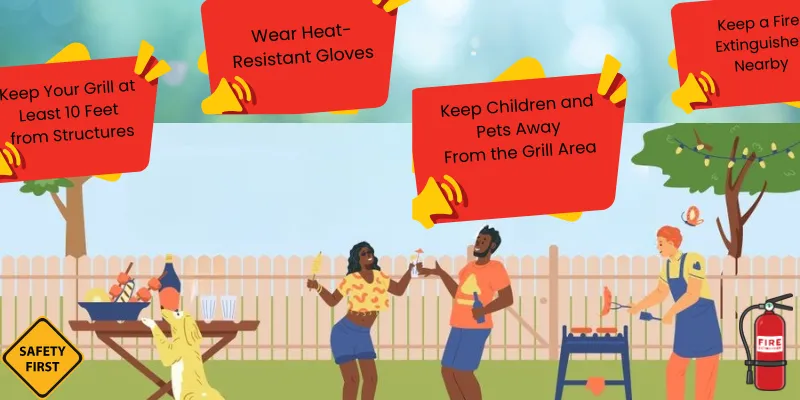
6. Use Long-Handled Tools to Avoid Burns
Invest in long-handled spatulas, tongs, and brushes. These allow you to handle food without getting too close to the flames or hot surfaces, reducing the chance of burns.
7. Wear Heat-Resistant Gloves
Wear heat-resistant gloves to protect your hands when moving hot grill grates, adjusting vents, or handling flare-ups. Don’t use regular kitchen mitts—they can’t handle the high temperatures of grilling.
8. Don’t Overload The Grill With Food
Overcrowding the grill can cause grease to drip, leading to flare-ups. Give each item enough space to cook properly and avoid flare hazards.
9. Keep Children and Pets Away From the Grill Area
Create a “grill safety zone” of at least 3 feet around your grill where kids and pets aren’t allowed. This prevents accidents and keeps little hands and paws out of harm’s way.
10. Only Use Grills Outdoors in Well-Ventilated Areas
Grilling indoors or in enclosed spaces can cause dangerous carbon monoxide buildup. Always grill outdoors where fresh air can circulate freely.
11. Open the Grill Lid Before Lighting It
Lighting a gas grill with a closed lid can cause gas buildup and a fireball. Always keep the lid open during ignition to allow the gas to dissipate safely.
12. Store Propane Tanks Upright and Safely
Always store propane tanks upright, away from direct sunlight or heat sources. Laying them down or placing them near heat can cause leaks or pressure buildup.
13. Avoid Using Lighter Fluid on Hot Coals
Never add lighter fluid to already hot or glowing coals—it can ignite suddenly and cause burns or fires. Use a chimney starter or electric starter instead for safe ignition.
14. Let the Grill Cool Completely Before Covering
Even if the grill looks cool, parts can remain hot for hours. Wait until it’s completely cool to the touch before covering it or storing it.
15. Dispose of Coals in a Metal Bucket, Not Plastic
Once coals are thoroughly cooled (usually 24–48 hours), transfer them to a metal container with a tight lid. Never throw them in plastic bins or near anything flammable.
16. Never Grill in a Garage or Enclosed Patio
Even if the door is open, grilling in a garage traps heat and carbon monoxide. Always set up in an open outdoor area with good airflow.
17. Watch for Overhanging Branches and Roofs
Overhead structures can catch fire from heat or flare-ups. Choose an open space that’s clear of low-hanging trees, awnings, or patio umbrellas.
18. Keep Alcohol and Flammable Liquids Far from Flames
Flammable drinks and liquids can catch fire if spilled near flames. Keep them on a separate table or away from the grilling zone.
19. Use a Drip Pan to Prevent Grease Flare-Ups
A drip pan under fatty meats like burgers or sausages catches grease before it hits the flames. This reduces sudden flare-ups and keeps your cook steady.
20. Always Follow the Manufacturer’s Instructions
Each grill model has specific safety guidelines. Read the manual to learn how to use and maintain it properly. This step is essential for long-term safety.
Conclusion
So guys, I am going to wrap up this guide on grill safety tips with a quick personal note—grilling is one of the best ways to enjoy food and family, but only when done responsibly. I always keep a fire extinguisher nearby and make sure the kids know the “no-go” zone around the grill. A few simple habits can go a long way. Grill smart, stay safe, and enjoy your food with peace of mind.
Found this helpful? Please share it with a friend who’s new to grilling!
Frequently Asked Questions (FAQ)
Got questions about grill safety? Whether you’re using charcoal or gas, these quick answers will help you grill safely and with confidence.
Keep your grill at least 10 feet from your house, deck railings, and any overhangs. This helps prevent fires caused by heat or flare-ups. It’s a small step that makes a big safety difference.
Yes! Grease buildup is one of the leading causes of grill fires. After cooking, a quick scrape and wipe-down keep things safer—and your food will taste better, too.
Mix a little dish soap with water and brush it over the hose and connections. Turn on the gas (without lighting) and look for bubbles—if you see any, there’s a leak. Always fix leaks before using the grill.
A Class B or multi-purpose (ABC) fire extinguisher is best for grill fires. Keep it within reach but away from direct heat. I always double-check mine before a big cookout.
Nope—never grill in enclosed or semi-enclosed areas. Even with good airflow, carbon monoxide and heat buildup can be dangerous. Always grill outdoors in open, well-ventilated spaces.
Grills can flare up quickly due to dripping fat or windy conditions. A small flame could turn into a big fire if you step away. Stay close and observe—it’s a simple habit that prevents disasters.
Let coals cool completely (this can take 24+ hours). Then, place them in a metal container with a lid. Never use plastic bins or toss hot coals into the trash.
Yes—long-handled tongs, spatulas, and heat-resistant gloves are a must. These keep your hands and arms away from high heat. I always gear up before I even open the lid.
Trim excess fat off meats and use a drip pan to catch grease. Keep a spray bottle of water handy for small flare-ups, but avoid spraying large flames. And never grill with the lid open during big flare-ups—it worsens them.
First, don’t panic. Close the grill lid to cut off oxygen, turn off the burners (if gas), and back away. Use your fire extinguisher only if needed—and call 911 if it’s out of control.

- Be Respectful
- Stay Relevant
- Stay Positive
- True Feedback
- Encourage Discussion
- Avoid Spamming
- No Fake News
- Don't Copy-Paste
- No Personal Attacks



- Be Respectful
- Stay Relevant
- Stay Positive
- True Feedback
- Encourage Discussion
- Avoid Spamming
- No Fake News
- Don't Copy-Paste
- No Personal Attacks
